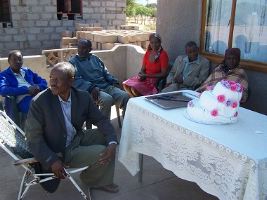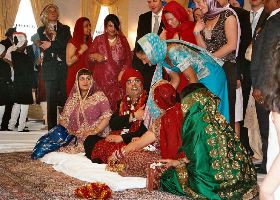 Where maids in taffeta dresses with bouquets of white lilies
serve no purpose. Where overly smart evening wear make for overly stiff guests
who can't wait for the affair to end. Where "here's to the bride and groom"
really means "I can't stand that you both look so deliriously happy and I feel
like crap that you've made me give this speech." This is the essence of a
wedding in the glorious U.S. of A. And, it stinks.
Where maids in taffeta dresses with bouquets of white lilies
serve no purpose. Where overly smart evening wear make for overly stiff guests
who can't wait for the affair to end. Where "here's to the bride and groom"
really means "I can't stand that you both look so deliriously happy and I feel
like crap that you've made me give this speech." This is the essence of a
wedding in the glorious U.S. of A. And, it stinks.
I always knew that in other cultures the joining of two individuals in holy matrimony held far more significance for both the couple and those in attendance than it did in America. But I never knew how much until I witnessed a wedding outside the confines of this insular nation. Even in cultures where weddings are typically far more colorful and meaningful such as in China and India, things tend to get a tad adulterated when integrated into an American context.
Because the truth is... brevity, pomp and pride seem to characterize the weddings here in the States. And none of these make for a truly festive occasion or a long-lasting marriage.
So, I ventured to the region of Southern Africa to see what I could find.
Take something as simple (or complicated) as the dowry or bride price. For brides in Africa, depending on her schooling, wifely abilities (cooking, cleaning), social status and beauty, the negotiations can be quite protracted (3 months to 3 years, even) because her family must be satisfied that their daughter's worth isn't being overlooked. She is, after all, a precious gem and must be appraised for all of her assets.
Plus, they dare not shortchange themselves for the years of investment it took to rear such a damsel.
While in Indian cultures, gold may serve as proper compensation, in Botswana - the nation just north of South Africa - eight to 10 cows is standard payment for a man to take a wife. My friend, Idah Maele, a radio journalist in Botswana who received tertiary education in the States, was worth all 10. And, her suitor had to pay up.
Not only does the bride price fortify the woman's self-concept as a virtuous Proverbs 31 wife, but it sends a message to all the triflin', good-for-nothing-type a-brothas -- "Don't step to her unless you've got something to back it up."
Overseas Wedding Lesson 1
 Lesson #1: I
think every scrub in America should take note of this dowry tradition. While it
may not be able to apply wholly in this culture, the principle sure does. Make sure you value her enough to save up and
have some cash to prove your level of earnestness.
Lesson #1: I
think every scrub in America should take note of this dowry tradition. While it
may not be able to apply wholly in this culture, the principle sure does. Make sure you value her enough to save up and
have some cash to prove your level of earnestness.
In America, the bridal party is comprised of pairs of young men and women who are close friends and relatives of the bride and groom. I dare say they serve very little purpose besides raiding your open bar and pining about how they're "always a bridesmaid and never a bride." The good ones offer moral support and dress maintenance for you at the altar, but it's normal for a man and woman to be sweating bullets or tripping over a train without a second look by the best man or maid of honor.
Why? Well, they are merely showpieces in America.
Not so in other cultures. You work for your name in the printed program.
In Botswana, you are expected to be of assistance in planning, cooking and cleaning into the wee hours of the morning before the wedding. You also stick around to help the bride get acclimated to her new home - her new husband's domain.
Additionally, there are several choreographed dances that you learn and rehearse weeks before the wedding so that your presence brings with it life and vibrancy. You are officially adding to the festivities with your lively kicks and spins and you are giving the guests permission to celebrate with you and the happy couple. Some may even learn the routines and follow you in a line dance out of the church.
In fact, no one is exempt from participating. Breaking into spontaneous song and dance is the norm - regardless of it being a part of the program or not. You'd be given a venomous stare and escorted out by ushers if you sing or dance out of turn in America.
Overseas Wedding Lesson 2
 Lesson #2 -
Weddings don't have to be boring. They can truly be celebratory occasions with the
right mood set by the bridal party. It starts from the head and trickles down
to the guests. No one covets you for marrying the village's eligible bachelor.
In fact, you support the bride in song, dance, word and deed. And, even if you
feel the urge to protest on that day, that line about "speak now or forever
hold your piece" isn't included. There's actually a much more fool-proof method
of holding the psychos at bay in their culture. A wedding announcement is
published in the local media for a whole 21 days prior to the wedding so that
any woman who feels she is entitled to your man can address it before your big
day.
Lesson #2 -
Weddings don't have to be boring. They can truly be celebratory occasions with the
right mood set by the bridal party. It starts from the head and trickles down
to the guests. No one covets you for marrying the village's eligible bachelor.
In fact, you support the bride in song, dance, word and deed. And, even if you
feel the urge to protest on that day, that line about "speak now or forever
hold your piece" isn't included. There's actually a much more fool-proof method
of holding the psychos at bay in their culture. A wedding announcement is
published in the local media for a whole 21 days prior to the wedding so that
any woman who feels she is entitled to your man can address it before your big
day.
Not only do
elders from both sides meet for dowry negotiations before the wedding, they are
integral in offering counsel to the bride and groom. Thus, the couple is definitely not entering
into this union ill-advisedly. The elders make sure of that.
Are they a good match? Does the husband's family have enough means to support the bride? Do the women in the groom's household seem well cared for? Does the family have a good reputation? Also, does the girl have good manners? Does she have a taint to her name? Does she have the makings of a good wife and mother? Does she want to work after marriage or stay at home?
Armed with this knowledge, the elders - comprised of married uncles and aunts on either side - make wise recommendations such as "remember to make breakfast for him every morning," "don't argue in public" and "don't allow your passion for football to interfere with your marriage."
The advice is even adapted to modern time times such as "don't take cell phone calls in dark corners away from your spouse because they are cause for jealousy."
Counseling sessions like these are integrated into the wedding activities in Botswana and you dare not skip over them for the sake of fad. They are as serious as saying the vows before a cloud of witnesses.
Overseas Wedding Lesson 3
 Lesson #3: A
couple's family should always be involved in the marriage. Even your crazy
cousins can offer advice that will help to preserve your marriage. If they are
well-intentioned, as many relatives are, they will offer you tidbits from their
own experience. You should take heed humbly and apply what is shared during
these sessions.
Lesson #3: A
couple's family should always be involved in the marriage. Even your crazy
cousins can offer advice that will help to preserve your marriage. If they are
well-intentioned, as many relatives are, they will offer you tidbits from their
own experience. You should take heed humbly and apply what is shared during
these sessions.
Now, in a traditional village wedding in Africa, all of the bride's belongings are transferred to the groom's home on the second day of festivities. Not even a pair of underwear is left behind.
This is symbolic of the transfer of power from her mother and father and onto her new husband. It is perfectly Biblical that the husband begin to serve as the new covering and protectorate of the lady. She should look to him for all of her lifelong provision.
In fact, I was told that if any of the wife's family members need something, they should contact the husband so he can consult with his wife about their wants or needs. The same goes for if the husband's family desires something. They are to consult with his wife about the issue - not him. This way, there is no trace of underhanded conspiracy performed by a meddling family member that may fracture a marital union.
Overseas Wedding Lesson 4
 Lesson #4: You are now one flesh. All power is transferred over
from the old home to the new home of the newlyweds. A meddling mother-in-law is
kept at bay under this rule. Conniving brothers and sisters should think twice
about asking for money from their dear sibling who has a soft spot for them.
Why? Because there's a new boss in charge of their brother or sister. This is
proper protocol.
Lesson #4: You are now one flesh. All power is transferred over
from the old home to the new home of the newlyweds. A meddling mother-in-law is
kept at bay under this rule. Conniving brothers and sisters should think twice
about asking for money from their dear sibling who has a soft spot for them.
Why? Because there's a new boss in charge of their brother or sister. This is
proper protocol.
A bride is cemented into her husband's family forever. She will participate in all future family rituals. In Botswana, there is even an official family scarf and shawl that she receives. She is expected to even be buried where the rest of the family is buried. Marriage is lifelong.
Overseas Wedding Lesson 5
 Lesson #5: Divorce is not an option. The "I do" is not
circumstantial. Don't get me wrong. If there are issues in the marriage, they
don't expect you to swallow it without squeaking. At any time you believe a
problem has arisen that is too big for you to address, you can call together
the family elders to help you. And, they will. This support group is in place
as to not have you at the mercy of the legal system for his bad morning breath
or her tight skirts in public.
Lesson #5: Divorce is not an option. The "I do" is not
circumstantial. Don't get me wrong. If there are issues in the marriage, they
don't expect you to swallow it without squeaking. At any time you believe a
problem has arisen that is too big for you to address, you can call together
the family elders to help you. And, they will. This support group is in place
as to not have you at the mercy of the legal system for his bad morning breath
or her tight skirts in public.
We can all learn from the wedding proceedings of a culture outside our own. With such time, money, and effort invested into two people's lives, we can expect a few things: they will produce Godly seed with some of the same solid principles; the whole community will benefit from the union and the union will last forever.
And, isn't marriage and family the bedrock of any high-functioning society?

